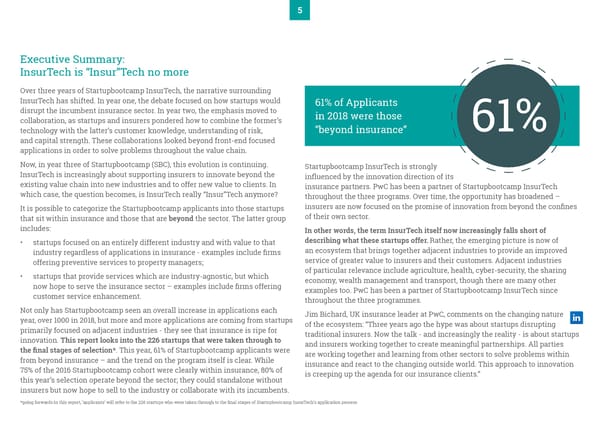5 Executive Summary: InsurTech is “Insur”Tech no more Over three years of Startupbootcamp InsurTech, the narrative surrounding InsurTech has shifted. In year one, the debate focused on how startups would 61% of Applicants disrupt the incumbent insurance sector. In year two, the emphasis moved to in 2018 were those collaboration, as startups and insurers pondered how to combine the former’s “beyond insurance” 61% technology with the latter’s customer knowledge, understanding of risk, and capital strength. These collaborations looked beyond front-end focused applications in order to solve problems throughout the value chain. Now, in year three of Startupbootcamp (SBC), this evolution is continuing. Startupbootcamp InsurTech is strongly InsurTech is increasingly about supporting insurers to innovate beyond the influenced by the innovation direction of its existing value chain into new industries and to offer new value to clients. In insurance partners. PwC has been a partner of Startupbootcamp InsurTech which case, the question becomes, is InsurTech really “Insur”Tech anymore? throughout the three programs. Over time, the opportunity has broadened – It is possible to categorize the Startupbootcamp applicants into those startups insurers are now focused on the promise of innovation from beyond the confines that sit within insurance and those that are beyond the sector. The latter group of their own sector. includes: In other words, the term InsurTech itself now increasingly falls short of • startups focused on an entirely different industry and with value to that describing what these startups offer. Rather, the emerging picture is now of industry regardless of applications in insurance - examples include firms an ecosystem that brings together adjacent industries to provide an improved offering preventive services to property managers; service of greater value to insurers and their customers. Adjacent industries • startups that provide services which are industry-agnostic, but which of particular relevance include agriculture, health, cyber-security, the sharing now hope to serve the insurance sector – examples include firms offering economy, wealth management and transport, though there are many other customer service enhancement. examples too. PwC has been a partner of Startupbootcamp InsurTech since throughout the three programmes. Not only has Startupbootcamp seen an overall increase in applications each Jim Bichard, UK insurance leader at PwC, comments on the changing nature year, over 1000 in 2018, but more and more applications are coming from startups of the ecosystem: “Three years ago the hype was about startups disrupting primarily focused on adjacent industries - they see that insurance is ripe for traditional insurers. Now the talk - and increasingly the reality - is about startups innovation. This report looks into the 226 startups that were taken through to and insurers working together to create meaningful partnerships. All parties the final stages of selection*. This year, 61% of Startupbootcamp applicants were are working together and learning from other sectors to solve problems within from beyond insurance – and the trend on the program itself is clear. While insurance and react to the changing outside world. This approach to innovation 75% of the 2016 Startupbootcamp cohort were clearly within insurance, 80% of is creeping up the agenda for our insurance clients.” this year’s selection operate beyond the sector; they could standalone without insurers but now hope to sell to the industry or collaborate with its incumbents. *going forwards in this report, ‘applicants’ will refer to the 226 startups who were taken through to the final stages of Startupbootcamp InsurTech’s application process
 Breaking Boundaries | PwC & Startupbootcamp Page 5 Page 7
Breaking Boundaries | PwC & Startupbootcamp Page 5 Page 7